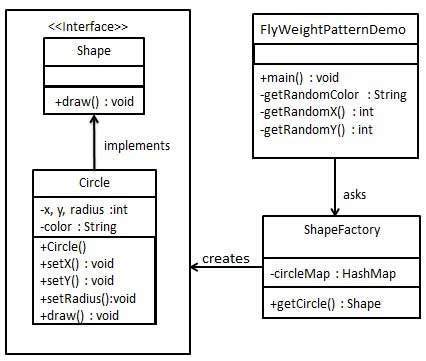Flyweight Pattern
Flyweight Pattern
A Flyweight Pattern says that just "to reuse already existing similar kind of objects by storing them and create new object when no matching object is found". One important feature of flyweight objects is that they are immutable.
Advantage of Flyweight Pattern
- It reduces the number of objects.
- It reduces the amount of memory and storage devices required if the objects are persisted
Usage of Flyweight Pattern
- When an application uses number of objects
- When the storage cost is high because of the quantity of objects.
- When the application does not depend on object identity.
- Flyweight pattern is primarily used to reduce the number of objects created and to decrease memory footprint and increase performance.
Implementation
We are going to create a Shape interface and concrete class Circle implementing the Shapeinterface. A factory class ShapeFactory is defined as a next step.
ShapeFactory has a HashMap of Circle having key as color of the Circle object. Whenever a request comes to create a circle of particular color to ShapeFactory, it checks the circle object in its HashMap, if object of Circle found, that object is returned otherwise a new object is created, stored in hashmap for future use, and returned to client.
FlyWeightPatternDemo, our demo class, will use ShapeFactory to get a Shape object. It will pass information (red / green / blue/ black / white) to ShapeFactory to get the circle of desired color it needs.

Step 1
Create an interface.
Shape.java
public interface Shape { void draw(); }
Step 2
Create concrete class implementing the same interface.
Circle.java
public class Circle implements Shape { private String color; private int x; private int y; private int radius; public Circle(String color){ this.color = color; } public void setX(int x) { this.x = x; } public void setY(int y) { this.y = y; } public void setRadius(int radius) { this.radius = radius; } @Override public void draw() { System.out.println("Circle: Draw() [Color : " + color + ", x : " + x + ", y :" + y + ", radius :" + radius); } }
Step 3
Create a factory to generate object of concrete class based on given information.
ShapeFactory.java
import java.util.HashMap; public class ShapeFactory { // Uncomment the compiler directive line and // javac *.java will compile properly. // @SuppressWarnings("unchecked") private static final HashMap circleMap = new HashMap(); public static Shape getCircle(String color) { Circle circle = (Circle)circleMap.get(color); if(circle == null) { circle = new Circle(color); circleMap.put(color, circle); System.out.println("Creating circle of color : " + color); } return circle; } }
Step 4
Use the factory to get object of concrete class by passing an information such as color.
FlyweightPatternDemo.java
public class FlyweightPatternDemo { private static final String colors[] = { "Red", "Green", "Blue", "White", "Black" }; public static void main(String[] args) { for(int i=0; i < 20; ++i) { Circle circle = (Circle)ShapeFactory.getCircle(getRandomColor()); circle.setX(getRandomX()); circle.setY(getRandomY()); circle.setRadius(100); circle.draw(); } } private static String getRandomColor() { return colors[(int)(Math.random()*colors.length)]; } private static int getRandomX() { return (int)(Math.random()*100 ); } private static int getRandomY() { return (int)(Math.random()*100); } }
Step 5
Verify the output.
Creating circle of color : Black Circle: Draw() [Color : Black, x : 36, y :71, radius :100 Creating circle of color : Green Circle: Draw() [Color : Green, x : 27, y :27, radius :100 Creating circle of color : White Circle: Draw() [Color : White, x : 64, y :10, radius :100 Creating circle of color : Red Circle: Draw() [Color : Red, x : 15, y :44, radius :100 Circle: Draw() [Color : Green, x : 19, y :10, radius :100 Circle: Draw() [Color : Green, x : 94, y :32, radius :100 Circle: Draw() [Color : White, x : 69, y :98, radius :100 Creating circle of color : Blue Circle: Draw() [Color : Blue, x : 13, y :4, radius :100 Circle: Draw() [Color : Green, x : 21, y :21, radius :100 Circle: Draw() [Color : Blue, x : 55, y :86, radius :100 Circle: Draw() [Color : White, x : 90, y :70, radius :100 Circle: Draw() [Color : Green, x : 78, y :3, radius :100 Circle: Draw() [Color : Green, x : 64, y :89, radius :100 Circle: Draw() [Color : Blue, x : 3, y :91, radius :100 Circle: Draw() [Color : Blue, x : 62, y :82, radius :100 Circle: Draw() [Color : Green, x : 97, y :61, radius :100 Circle: Draw() [Color : Green, x : 86, y :12, radius :100 Circle: Draw() [Color : Green, x : 38, y :93, radius :100 Circle: Draw() [Color : Red, x : 76, y :82, radius :100 Circle: Draw() [Color : Blue, x : 95, y :82, radius :100

Comments
Post a Comment